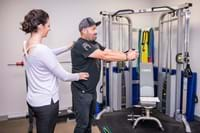
"I need support with a neurological condition."
Specialised Exercise for Neurological Health and Recovery
Movement is medicine for the brain.
Research shows that appropriate exercise not only improves physical function but can actually enhance neuroplasticity (your brain's ability to form new connections and adapt). Our programs harness these benefits through carefully structured activities tailored to your specific needs.
At Exercise for Rehabilitation & Health, we understand the unique challenges that come with neurological conditions. Our dedicated team specialises in creating exercise programs that address the specific symptoms and functional limitations of various neurological disorders.
We focus on what you CAN do, not what you can't. Our approach builds on your existing strengths while gradually addressing limitations to help you maintain independence and improve daily function.
Our Expertise Covers a Range of Neurological Conditions
Parkinson's Disease
Our specialised exercise programs focus on addressing the key movement challenges in Parkinson's including rigidity, bradykinesia (slowness of movement), and balance issues. Regular, targeted exercise has been shown to help manage symptoms and potentially slow disease progression and protect the brain at the neuronal level1.
Stroke Recovery
Whether you're in early recovery or years post-stroke, appropriate exercise can help improve function and prevent secondary complications. We focus on retraining movement patterns, building strength in affected areas, and developing compensatory strategies that enhance independence.
Multiple Sclerosis
Our MS-specific programs adapt to the fluctuating nature of your symptoms. We emphasise energy conservation, temperature management during exercise, and activities that maintain function while managing fatigue — a key component of MS management.
Falls Prevention and Balance Training
For those experiencing balance issues or fear of falling, our specialised balance programs use progressive challenges to improve stability, reaction time, and confidence. We combine strength training with specific balance exercises, using state of the art balance management equipment, that translate to real-world situations.
Vestibular Rehabilitation
If you're dealing with dizziness, vertigo, or balance problems related to inner ear dysfunction, our vestibular rehabilitation programs include specific exercises to reduce symptoms and improve stability.
Our Approach to Neurological Exercise Therapy
We begin with a comprehensive assessment of your current function, symptoms, and goals. This allows us to develop a program that addresses your specific needs rather than taking a one-size-fits-all approach.
Your program might include:
-
Targeted strength training focusing on affected muscle groups
-
Balance and coordination exercises scaled to your current abilities
-
Functional movement training related to daily activities
-
Gait (walking) retraining to improve efficiency and safety
-
Dual-task training to improve cognitive-motor connections
-
Symptom management strategies specific to your condition
Throughout your program, we monitor your progress and make adjustments as needed. Neurological conditions can change over time, and our approach evolves with you.
How soon after diagnosis should I start an exercise program?
Generally, the sooner the better. Early intervention with appropriate exercise can help maintain function and potentially slow progression in many neurological conditions. However, it's never too late to start. Even those with long-standing conditions can benefit from targeted exercise programs.
Is exercise safe progress neurological conditions?
Yes, when properly prescribed. Our clinicians are specifically trained in neurological rehabilitation and understand how to adapt exercise to be safe and beneficial for progressive conditions. We continuously monitor and adjust your program as your condition changes.
Will medicare cover my sessions?
Many neurological conditions qualify for Medicare rebates through Chronic Disease Management plans (formerly Enhanced Primary Care plans). Ask your GP if you're eligible for a referral. We also work with NDIS participants and accept WorkCover and TAC clients.
How often will I need to attend sessions?
This varies based on your condition, goals, and support needs. Initially, we typically recommend weekly or bi-weekly sessions to establish your program and ensure proper technique. As you progress, many clients transition to less frequent "check-in" sessions with home exercise programs in between.
How is your approach different from general physical therapy?
Our clinicians have specific training in neurological conditions and understand the unique challenges and opportunities they present. We use specialised assessment techniques and interventions based on the latest research in neurological rehabilitation and neuroplasticity.

